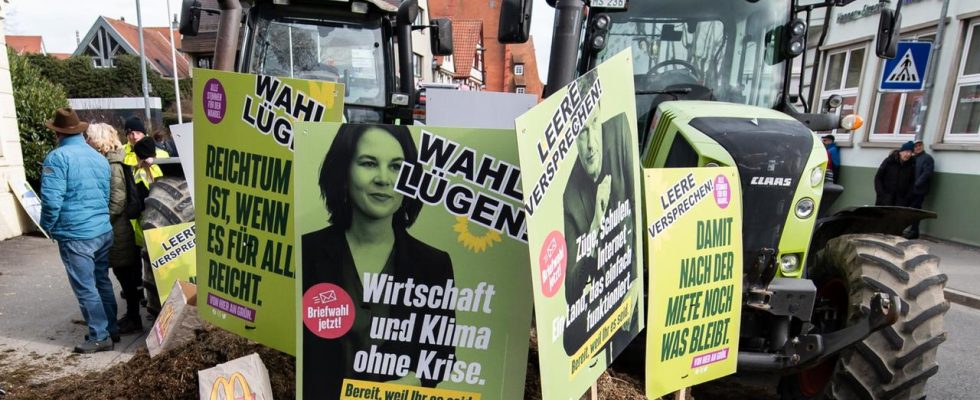analysis
First the blockade against Habeck on the North Sea ferry, now tumult at the political Ash Wednesday in Biberach. Why are the protests so massively directed against the Greens? And how do they deal with it?
Cem Özdemir has been confronting angry farmers for weeks. The Minister of Agriculture shows understanding for emotions and existential fears. But after the cancellation of the political Ash Wednesday in Biberach, the Green politician says: “The willingness to understand ends when you overshoot the mark.” And from his perspective, that’s what happened in Biberach.
His party colleague Robert Habeck appears contrite at a citizens’ dialogue in Leipzig. If the purpose of a demonstration is to start a conversation, then, in his words, the attempt has “been terribly wrong.” The Federal Minister of Economics has his own experience with this. At the beginning of January, an angry crowd in North Frisia prevented him from leaving a ferry.
Greens are the most frequently targeted by attacks
According to the federal government, the police registered almost 2,800 crimes against politicians last year. More than 1,200 of them were directed against representatives of the Green Party. No other party is currently experiencing so much violence, hatred and rejection.
Success in the middle makes them a sought-after opponent
To understand where the increasingly harsh Green bashing comes from, you have to look back a year and a half. In the summer of 2022, the Greens will be riding a wave of success. Record results in the elections in Schleswig-Holstein and North Rhine-Westphalia.
In the ARD Germany trend they stand at 23 percent. Annalena Baerbock and Robert Habeck were by far the most popular politicians in the country at the time. Your pragmatic approach to arms projects, coal and nuclear energy annoys the party left. But the Greens successfully occupy the political center – and thus become a strategic goal.
Image of the ban party remains
In addition to the AfD, the Union in particular is targeting the party. Recently, CSU General Secretary Martin Huber blamed the Greens as “mainly responsible for the bad mood in the country.” And further: “You are a party driven by ideology. Anyone who stands for the heating law, for the asylum blockade, for the ban on meat cannot be a partner for us.” It doesn’t matter that no one is calling for a meat ban. The image of the ban party continues to stick with the Greens. In the fall, Sahra Wagenknecht described the Greens as “the most dangerous party in the Bundestag.”
Heating law as a tipping point for the coalition
In the party, the rejection of others is explained by the unreasonable demands of one’s own politics. Example of the heating law. This will be the tipping point for the Greens in March 2023 – and the entire traffic light.
The proposed law hits a stressed society – due to Corona, war and climate crisis. The proposals for climate-friendly heating replacement initially seem half-baked and poorly communicated. The opposition in the Bundestag is addressing the population’s fears of being overwhelmed. The FDP accuses the Greens of being stubborn: relying too one-sidedly on heat pumps and not being open enough to other technologies.
Greens complain about a lack of support for the SPD
The SPD is staying out of all this – that’s how many Greens perceive it. The trust in the traffic lights seems to have been used up now at the latest. The coalition appears to be divided from the outside and has not recovered from it to this day.
Now the economy is also weakening. The Federal Constitutional Court overturns the budget in mid-November. The planned reduction of subsidies for agriculture is bringing farmers to the barricades – new stress for the traffic lights. And especially for the green Agriculture Minister Özdemir.
Greens gain new members
The Greens do not want to be pushed into the role of victim. Party leader Ricarda Lang relies on objectivity. She calls on the democratic parties to discuss content: “Less enemy image, less outrage.” From their point of view, anyone who makes politics with outrage, fear and hate only strengthens parties that see it as their business.
As great as the hostility and rejection are, the Greens are at least still reaching out to their supporters. The party has gained more than 4,500 new members since the beginning of the year. In the current one ARD GermanyTrend The Greens are at 14 percent. They are the only traffic light party to almost achieve their result from the 2021 federal election, when they received 14.7 percent of the vote.
Björn Dake, ARD Berlin, tagesschau, February 15, 2024 5:32 p.m

